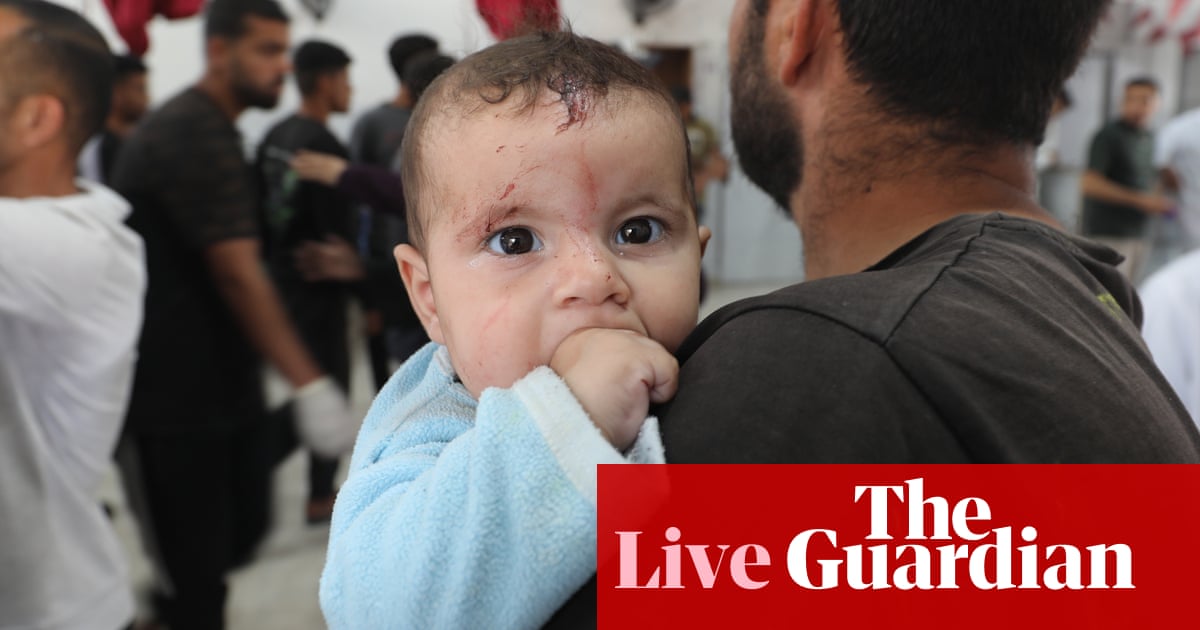Israel says ‘external pressure will not divert’ it after UK pauses trade talks
Israel said on Tuesday that external pressure will not change its course after the UK paused free trade talks over the war in Gaza and levelled new sanctions on settlers in the occupied West Bank.
“If, due to anti-Israel obsession and domestic political considerations, the British government is willing to harm the British economy – that is its own prerogative,” Israeli foreign ministry spokesperson Oren Marmorstein said in a statement, according to Agence France-Presse (AFP). “External pressure will not divert Israel from its path in defending its existence and security against enemies who seek its destruction.”
Key events
Summary of the day so far
It is approaching 8pm in Gaza City and Tel Aviv. Here is a summary of today’s developments:
-
The UK has suspended trade negotiations with Israel over its Gaza blockade, the UK foreign secretary, David Lammy, told parliament on Tuesday. He said the Israeli ambassador had been summoned. UK prime minister Keir Starmer described the situation in Gaza as “horrific” and “utterly intolerable”. It comes after the UK, France and Canada, yesterday issued their strongest condemnation yet of the way Israel is conducting its war on Gaza and repeated calls for a ceasefire.
-
Israel said on Tuesday that external pressure will not change its course after the UK paused free trade talks over the war in Gaza and levelled new sanctions on settlers in the occupied West Bank. “External pressure will not divert Israel from its path in defending its existence and security against enemies who seek its destruction,” Israeli foreign ministry spokesperson Oren Marmorstein said in a statement.
-
As many as 14,000 babies in Gaza could die in 48 hours if aid does not reach them in time, the UN’s humanitarian chief, Tom Fletcher, warned. “I want to save as many as these 14,000 babies as we can in the next 48 hours,” he told the BBC. Fletcher said five trucks of aid went into Gaza yesterday but described this as a “drop in the ocean”.
-
EU foreign ministers will discuss plans to review the bloc’s relationship with Israel, amid growing alarm about the dire humanitarian situation in Gaza.
-
Gaza’s health ministry said 87 people were killed by Israeli attacks over the past 24 hours and 290 were injured. “There are still a number of victims under the rubble and on the roads, the ambulance and civil defense teams cannot reach them,” it added in its post on Telegram.
-
Gaza City, Deir el-Balah, the Nuseirat refugee camp, the Jabalia refugee camp and the Bureij refugee camp were among the places targeted in deadly Israeli strikes, according to reports on Tuesday.
-
Qatar’s prime minister said Israel’s continuing assault on Gaza had undermined peace efforts. Speaking at Qatar’s economic forum, Sheikh Mohammed bin Abdulrahman bin Jassim Al-Thani said: “This irresponsible, aggressive behaviour undermines any potential chance for peace.”
-
The head of the UN agency for Palestinian refugees (Unrwa) said that the “siege on Gaza” could be stopped “if there is a political will”. Philippe Lazzarini, Unrwa’s commissioner general, said: “I think we are out of words to try to describe the hell and the horror people are going through.” Lazzarini said US president Donald Trump had the unique power to force Israeli prime minister Benjamin Netanyahu to “change the situation” in Gaza.
-
Australia has joined 22 other nations in condemning Israel over its decision to allow limited aid into Gaza while announcing a military expansion to “take control” of the besieged strip. In a statement on Tuesday morning Australian time, 23 countries, including the UK, Canada, New Zealand and Australia, urged Israel not to politicise humanitarian aid for the starving population.
-
Sweden’s top diplomat said on Tuesday that the Nordic country would work within the EU to push for sanctions against certain Israeli ministers over Israel’s treatment of civilian Palestinians in Gaza. Sweden’s foreign minister Maria Malmer Stenergard said the sanctions should target “[Israeli] ministers who are pushing an illegal settlement policy and actively opposing a future two-state solution”. But she insisted that Sweden was a “friend of Israel”.
-
US secretary of state Marco Rubio said on Tuesday that the US has not discussed the deportation of Palestinians from Gaza to Libya, but he said that Washington had asked other countries in the region if they would be open to accepting Palestinians who want to move voluntarily. Rubio, was testifying before the Senate foreign relations committee, when on Tuesday, a pro-Palestine protester disrupted the hearing.
-
Israeli authorities said on Tuesday that they had arrested two citizens suspected of carrying out “intelligence-gathering missions” at Iran’s behest near the defence minister’s home. The arrests are the latest in a spate of cases in which Israel has charged its own citizens with spying for the country’s arch-foe since the start of the war in Gaza in October 2023.
-
Iran’s supreme leader Ayatollah Ali Khamenei said on Tuesday that nuclear talks with the United States were unlikely to yield any results. “We don’t think it will lead to any outcome. We don’t know what will happen,” said Khamenei during a speech, adding that denying Iran’s right to enrich uranium was “a big mistake”.
-
The Lebanese health ministry said earlier today that an Israeli airstrike injured nine people in a drone attack on the coastal Tyre district in the south of the country. Three people are now in “critical condition”, the ministry said, adding that two children were among the injured.
-
Syria’s foreign minister said on Tuesday that the lifting of sanctions on his country shows an “international will” to support his country, after EU countries agreed to end most of its sanctions. Asaad al-Shaibani said “the Syrian people today have a very important and historic opportunity to rebuild their country”.
A member of Mahmoud Abbas’s delegation to Beirut told Agence France-Presse (AFP) on Tuesday that the Palestinian president will discuss the issue of weapons in Lebanon’s Palestinian refugee camps during his three-day visit to the country.
“The issue of Palestinian weapons in the camps will be one of the topics on the agenda for discussion between President Abbas, the Lebanese president and the Lebanese government,” said Ahmad Majdalani, a member of the Palestine Liberation Organisation’s executive committee accompanying Abbas during the visit, which begins on Wednesday.
The visit comes after Lebanese president Joseph Aoun said late last month that authorities were working to “withdraw (unauthorised) heavy and medium weapons from all Lebanese territory”, and that he would raise disarmament of the camps with Abbas.
A Lebanese government official, requesting anonymity as they were not authorised to brief the media, told AFP earlier this month that Abbas and Lebanese leaders would discuss “extending state authority to all Lebanese territory, including the Palestinian camps”.
Majdalani said “what matters to us in this new regional context is that we do not become part of Lebanon’s internal conflicts, and that the Palestinian cause is not exploited to serve any party”.
By longstanding convention, Lebanon’s army stays out of the Palestinian camps – where Abbas’ Fatah movement, militant group Hamas and other armed groups are present – and leaves the factions to handle security.
Hamas has claimed attacks on Israel from Lebanon during more than a year of hostilities between Israel and the Palestinian group’s Lebanese ally Hezbollah that erupted over the Gaza war.
According to the UN agency for Palestinian refugees, Unrwa, 500,000 Palestinians are registered as refugees in Lebanon, most of them descendants of those who fled their land during the creation of Israel in 1948. Due to their refugee status, most are unable to work legally in Lebanon, an issue Majdalani said Abbas would also address during the meeting.
US secretary of state Marco Rubio said on Tuesday that the United States has not discussed the deportation of Palestinians from Gaza to Libya, but he said that Washington had asked other countries in the region if they would be open to accepting Palestinians who want to move voluntarily.
“What we have talked to some nations about is if someone voluntarily and willingly says I want to go somewhere else for some period of time because I’m sick, because my children need to go to school, or what have you, are there countries in the region willing to accept them for some period of time?,” Rubio said, adding that he was not aware of Libya being included in that, reports Reuters.
Rubio also told the Senate foreign relations committee that the US was pleased to see the resumption of food shipments to Gaza, adding that the US understands that another 100 trucks are behind the initial ones to cross in to Gaza and more might enter in the coming days.
Israel arrests two accused of spying on defence minister for Iran
Israeli authorities said on Tuesday that they had arrested two citizens suspected of carrying out “intelligence-gathering missions” at Iran’s behest near the defence minister’s home, reports Agence France-Presse (AFP).
The arrests are the latest in a spate of cases in which Israel has charged its own citizens with spying for the country’s arch-foe since the start of the war in Gaza in October 2023.
Police and the Shin Bet domestic security agency said that “in a joint operation … Roi Mizrachi and his friend, Almog Attias, both 24, were arrested at the end of April for committing security offences after collecting intelligence in Kfar Ahim”, where defence minister Israel Katz lives.
The men were acting “on behalf of Iran” and motivated by “financial gain”, said the statement from the security agencies.
The Shin Bet and police said that Mizrachi and Attias were asked to carry out a number of missions near Katz’s home.
Indictments against the two men are expected to be filed in the coming days, the statement said.
The UK foreign secretary, David Lammy, said the Conservative frontbench was “refusing to confront the appalling reality of what is happening in Gaza and what the Netanyahu government is doing”, after the shadow foreign secretary, Priti Patel, queried the government’s decision to condemn Israel’s siege and stop free trade talks.
You can listen to that exchange in the video below:
A University of Cambridge college has announced it will divest from arms companies after student protest, reports the PA news agency.
King’s College said on Tuesday that its governing body has voted to “adopt a new responsible investment policy” to align with the values of its community.
It comes after pro-Palestine protesters staged demonstrations and set up encampments against the war in Gaza at Cambridge University last year.
Student-led group Cambridge for Palestine has been calling on the university to divest from companies “complicit in the ethnic cleansing of Palestine”.
Under the new policy, King’s College’s financial investments will exclude companies that are involved in activities “generally recognised as illegal or contravening global norms, such as occupation”. It will also exclude companies which produce military and nuclear weapons, weapons restricted by international treaty, or companies that produce key or dedicated components of such weapons.
The policy builds on discussions about the relationship between the college’s investments and its values, which were “prompted by the occupation of Ukraine and Palestinian territories”.
Gillian Tett, provost of King’s College, said:
This is a positive result from a process that engaged voices from all areas of our community.
I commend the members of the working group for their incredibly thoughtful engagement and deep commitment to work towards an approach that reflects the college’s values and demonstrates our capacity to model transformation.
According to the PA news agency, King’s College said the next steps will be to implement the changes across the college’s investment portfolio in the coming months, with an aim to complete no later than the end of the calendar year.
Student activist group King’s Cambridge 4 Palestine (KC4P) said:
King’s College’s decision must trigger global condemnation of Israel’s actions against the Palestinian people.
Stella Swain, youth and student officer at the Palestine Solidarity Campaign, said:
This is a massive victory, and speaks to the incredible power and commitment of student campaigning, at King’s College and across the country.
If King’s College, at the heart of Cambridge, can finally listen to its students and divest from the arms industry and companies complicit in the illegal occupation of Palestine, then every university can act to ensure they are on the right side of history.

Sarah Basford Canales
Australia has joined 22 other nations in condemning Israel over its decision to allow limited aid into Gaza while announcing a military expansion to “take control” of the besieged strip.
The Israeli prime minister, Benjamin Netanyahu, said his troops were “making progress” on taking control of Gaza after Israel’s military had earlier declared a central city a combat zone and killed more than 60 people in airstrikes, while a senior minister said Israel’s army would “wipe out” what remains of Palestinian Gaza.
The escalation comes as those in Gaza face a looming famine following Israel’s 11-week blockade of food, fuel and aid supplies from entering the territory.
In a statement on Tuesday morning Australian time, 23 countries, including the UK, Canada, New Zealand and Australia, urged Israel not to politicise humanitarian aid for the starving population.
About nine aid trucks were reportedly allowed into Gaza after the nearly three-month siege, but the UN’s humanitarian chief, Tom Fletcher, warned it was a mere “drop in the ocean of what is urgently needed”.
The joint statement acknowledged “indications of a limited restart of aid” but implored Israel to uphold humanitarian principles by allowing the full resumption of aid and for aid groups to be able to work independently and impartially.
“Food, medicines and essential supplies are exhausted. The population faces starvation. Gaza’s people must receive the aid they desperately need,” the countries said.
‘If there is a political will, the war can stop’, says head of Unrwa
The head of the UN agency for Palestinian refugees (Unrwa) said that the “siege on Gaza” could be stopped “if there is a political will”.
Speaking at the European Humanitarian Forum in Brussels, Philippe Lazzarini, Unrwa’s commissioner general, said:
I think we are out of words to try to describe the hell and the horror people are going through. It’s definitely beyond imagination.
But the worst in all this is we are confronted in a situation where, if there is a political will, the war can stop, the siege imposed on Gaza can be lifted.”
A pro-Palestine protester has disrupted a hearing where the US secretary of state, Marco Rubio, was testifying before the Senate foreign relations committee. The protester was seen being carried out as the hearing continued. The Guardian video team have shared this clip:
A leading writers’ advocacy group has condemned “ongoing threats, intimidation and violence against Palestinian journalists in Gaza by Hamas”.
PEN America said in a statement on Tuesday:
Threats and violence against Palestinian journalists for doing their work are unacceptable and Hamas and its affiliates must cease such attacks.
As journalists in Gaza continue to report under the constant threat of Israeli bombardment-the deadliest conditions for media workers in modern history-they must not also face persecution by Hamas for covering dissent and criticism of Hamas by Palestinian society.
The targeting of journalists through beatings, arrests, surveillance, and threats not only violates press freedom but chills coverage of critical issues, including public opposition to Hamas’s rule and the humanitarian toll of the war.
The writers’ advocacy group said that violations by Hamas are underreported due to fear of reprisal.
Israel says ‘external pressure will not divert’ it after UK pauses trade talks
Israel said on Tuesday that external pressure will not change its course after the UK paused free trade talks over the war in Gaza and levelled new sanctions on settlers in the occupied West Bank.
“If, due to anti-Israel obsession and domestic political considerations, the British government is willing to harm the British economy – that is its own prerogative,” Israeli foreign ministry spokesperson Oren Marmorstein said in a statement, according to Agence France-Presse (AFP). “External pressure will not divert Israel from its path in defending its existence and security against enemies who seek its destruction.”



